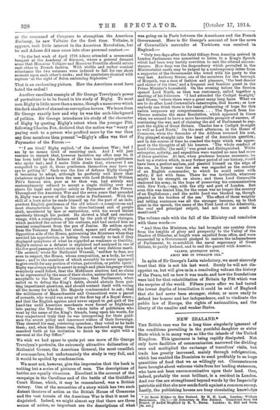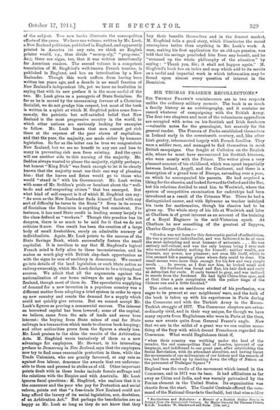NEW ZEALAND.* THE British race was for a long time
singularly ignorant of the conditions prevailing in the youthful daughter or sister State which is in many ways so like the islands of the United Kingdom. This ignorance is being rapidly dissipated. Not only have facilities of communication narrowed the dividing seas and multiplied the exchange of travellers' visits, but trade has greatly increased, mainly through refrigeration, which has enabled the Dominion to send profitably to us huge quantities of food that we as willingly eat. Circumstances have brought about welcome visits from her leading statesmen, who have not been uncommunicative upon their land. One, indeed, probably the most brilliant, is a resident in London. And our ties are strengthened beyond words by the Imperially patriotic aid that she now sends forth against a common enemy. Lastly, the publishing houses are busy circulating knowledge
• (1) Social We rein Nino Zealand. By H. H. Lusk. London: William Heinemann. [6s. —gadDemeersey_ in Mao Zealand. Translated from the French of Andr4 by B. Y. Banc London: G. Bell and Eons. [6s. net.] of the subject. Two new books illustrate the cosmopolitan efforts of the press. We have one volume, written by Mr. Lusk, a New Zealand politician, published in England, and apparently printed in America (at any rate, we think no English printer would, e.g., thus divide " monop-oly," " prog-ress," &c.); there are signs, too, that it was written intentionally for American readers. The second volume is a competent translation of M. Siegfried's well-known French treatise, is published in England, and has an introduction by a New Zealander. Though this work suffers from having been written ten years ago, and a decade is no small fraction of New Zealand's independent life, yet we have no hesitation in saying that with its new preface it is the more useful of the two. Mr. Lusk gives us a panegyric of State Socialism. So far as he is moved by the unreasoning fervour of a Christian Socialist, we do not grudge him respect, but most of the book is written in a spirit at which M. Siegfried pokes some fun— namely, the patriotic but self-satisfied belief that New Zealand is the most progressive country in the world, to which other nations are enviously looking for examples to follow. Mr. Lusk boasts that men cannot get rich there at the expense of the poor slaves of capitalism, and that the poor, the majority, are made richer by humane legislation. So far as the latter can be true we congratulate New Zealand, but we see no benefit to any one and loss to many in preventing rich men from existing. And the cynic will see another side to this nursing of the majority. Mr. Seddon always wanted to please the majority, rightly perhaps ; but honest "King Dick" was frank enough to let it be clearly known that the majority must use their one way of pleasing him : that the loaves and fishes would go to those who would " stand in " with his Government. Mr. Lusk writes with some of Mr. Seddon's pride or bombast about the "well- to-do and self-respecting citizen" that has emerged. But what kind of self-respect is it of which M. Siegfried can say: "As soon as the New Zealander finds himself faced with any sort of difficulty he turns to the State " P Even in its course of Socialism the Dominion is anything but consistent. For instance, it has used State credit in lending money largely to the class defined as "workers." Though this practice has its dangers, there is so much to be said for it that we do not criticize it now. One result has been the creation of a large body of small freeholders, surely an admirable nursery of individualists. Again, Mr. Lusk points to the success of the State Savings Bank, which successfully fosters the small capitalist. It is needless to say that M. Siegfried's logical French mind is fully alive to these inconsistencies, and he makes as much play with British slap-dash opportunism as with the signs he sees of snobbery in democracy. We cannot go into details of the land legislation or such State action as railway ownership, which Mr. Lusk declares to be a triumphant success. We admit that all the arguments against the nationalization of our home railways do not apply in New Zealand, though most of them do. The speculative supplying of demand for a new invention in a populous country was a different matter from adopting a tried system in order to open up new country and create the demand for a supply which could not quickly give returns. But we cannot accept Mr. Lusk's figures as proving a commercial success. The interest on borrowed capital has been lowered ; some of the capital, we believe, came from the sale of lands and never bore interest: the buying from State mines of coal for State railways is a transaction which tends to obscure book-keeping; and other authorities prove from the figures a steady loss. Mr. Lusk praises to the skies the results of the Arbitration Acts. M. Siegfried wrote tentatively of them as a new advantage for employees. Mr. Stewart, in his interesting preface to Democracy in New Zealand, says that the employers now try to find some reasonable protection in them, while the Trade Unionists, who are greatly favoured, at any rate as against free labour, denounce the awards that are unfavour- able to them and proceed to strike as of old. Other important points dealt with in these books include female suffrage and the relations with the Empire and with Australia. Mr. Lusk ignores fiscal questions : M. Siegfried, who realizes that it is the consumer and the poor who pay for Protection and social reform, points out that "a free-trade New Zealand could not long afford the luxury of its social legislation, nor, doubtless, of an Arbitration Act." But perhaps the beneficiaries are as happy as Mr. Lusk so long as they do not know that they
buy their benefits themselves and in the dearest market. M. Siegfried tells a good story, which illuminates the moral atmosphere better than anything in Mr. Lusk's work. A man, making his first application for an old-age pension, was told that his savings precluded him from any benefit, and he "summed up the whole philosophy of the situation" by saying : " Thank you, Sir; it shall not happen again." M. Siegfried's book has an index and map which add to its merits as a useful and impartial work in which information may be found upon almost every question of interest in the Dominion.



































 Previous page
Previous page